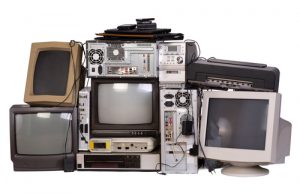 A former Utah-based CRT processor has been indicted on several counts related to its abandonment of more than 3.5 million pounds of crushed leaded glass three years ago.
A former Utah-based CRT processor has been indicted on several counts related to its abandonment of more than 3.5 million pounds of crushed leaded glass three years ago.

 A former Utah-based CRT processor has been indicted on several counts related to its abandonment of more than 3.5 million pounds of crushed leaded glass three years ago.
A former Utah-based CRT processor has been indicted on several counts related to its abandonment of more than 3.5 million pounds of crushed leaded glass three years ago.
 California’s hike in the fee to fund electronics recycling is explained, and a repair advocacy group accuses OEMs of deflecting pressure to improve repairability.
California’s hike in the fee to fund electronics recycling is explained, and a repair advocacy group accuses OEMs of deflecting pressure to improve repairability.
Adelante Document Destruction of Albuquerque, N.M.; American Document Shredding of Oklahoma City; Corodata Shredding of San Jose, Calif.; DestruPack delegacion Valencia of Valencia, Spain; Destrupack S.L. of Barcelona, Spain; DocuGUARD of Enid, Okla.; DocuVault Delaware Valley of West Deptford, N.J.; Gestion Confidencial Destrupack of Madrid; Goodwill Industries of Northwest Texas of Lubbock, Texas; IROW of Mosinee, Wisc.; Lincoln Archives of Tonawanda, N.Y.; Pacific Shredding of Fresno, Calif.; Pacific Shredding of Sacramento, Calif.; Pacific Shredding of Stockton, Calif.; SecurShred of South Burlington, Vt.; Shred One Security Corp of Huntingdon Valley, Pa. and United Document Destruction and Storage of Reading, Pa. have either achieved or renewed their NAID certifications for physical destruction of hard drives.
Visit our archive to view previous editions of the scorecard.
 The former leaders of CRT outlet Closed Loop Refining and Recovery have been directed by a court to pay more than $18 million for breaking the lease at the company’s Columbus, Ohio headquarters and leaving behind more than 100 million pounds of CRT glass.
The former leaders of CRT outlet Closed Loop Refining and Recovery have been directed by a court to pay more than $18 million for breaking the lease at the company’s Columbus, Ohio headquarters and leaving behind more than 100 million pounds of CRT glass.
Millions of pounds of CRT devices abandoned by Utah’s Stone Castle Recycling continue to plague local communities. Continue Reading
A CRT-collecting e-scrap firm in Utah has come under extensive state-level scrutiny for being slow to address operational miscues identified by regulators.
Stone Castle Recycling, which has been mired in an ongoing back-and-forth with Utah state regulators, recently experienced its second fire of the year.
![]() The EPEAT sustainable electronics program now includes mobile phones, providing assurance to buyers that the qualifying devices meet certain standards for end-of-life management.
The EPEAT sustainable electronics program now includes mobile phones, providing assurance to buyers that the qualifying devices meet certain standards for end-of-life management.
 Global e-commerce site eBay is honoring a California woman who immigrated from Colombia with nothing more than a suitcase and later co-founded a successful e-scrap company.
Global e-commerce site eBay is honoring a California woman who immigrated from Colombia with nothing more than a suitcase and later co-founded a successful e-scrap company.
 An initiative funded by the federal government could help solve a key materials recovery issue in e-scrap.
An initiative funded by the federal government could help solve a key materials recovery issue in e-scrap.
